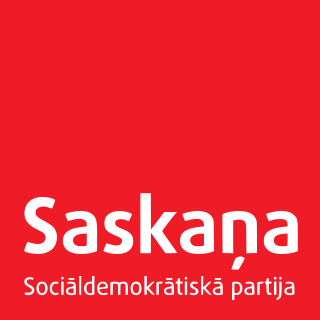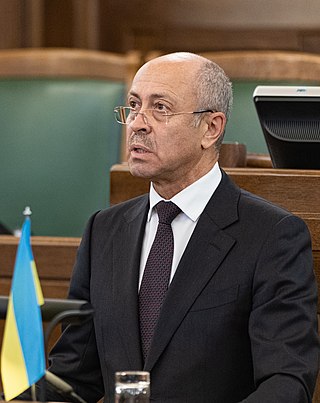
The politics of Latvia takes place in a framework of a parliamentary representative democratic republic, whereby the prime minister is the head of government, and of a multi-party system. The President holds a primarily ceremonial role as Head of State. Executive power is exercised by the government. Legislative power is vested in both the government and parliament, the Saeima. The Judiciary is independent of the executive and the legislature. The Economist Intelligence Unit rated Latvia a "flawed democracy" in 2022.

The Latvian Russian Union (LKS) is a political party in Latvia supported mainly by ethnic Russians and other Russian-speaking minorities. The co-chairpersons of the Latvian Russian Union were Miroslavs Mitrofanovs and an alleged Russian agent Tatjana Ždanoka.

Russians in the Baltic states is a broadly defined subgroup of the Russian diaspora who self-identify as ethnic Russians, or are citizens of Russia, and live in one of the three independent countries — Estonia, Latvia, and Lithuania — primarily the consequences of the USSR's forced population transfers during occupation. As of 2023, there were approximately 887,000 ethnic Russians in the three countries, the year of the last census during the 1944–1991 Soviet occupation of the three Baltic countries.

Riga City Council is the government of the city of Riga, the capital of Latvia. Its meeting place is in the Riga Town Hall at the Town Hall Square (Rātslaukums) in the very heart of Riga.
In Latvia, Russians have been the largest ethnic minority in the country for the last two centuries. The number of Russians in Latvia more than quadrupled during the Soviet occupation of Latvia when the size of the community grew from 8.8% of the total population in 1935 (206,499) to 34.0% in 1989 (905,515). It started to decrease in size again after Latvia regained independence in 1991 falling to 23.4% at the beginning of 2024.

Harmony Centre was a social-democratic political alliance in Latvia. It originally consisted of five political parties: the National Harmony Party, the Socialist Party of Latvia, New Centre, the Daugavpils City Party, and the Social Democratic Party. Through a series of mergers they were eventually reduced to two: Social Democratic Party "Harmony" and the Socialist Party.
Rīgas Satiksme is a municipally-owned public transportation and infrastructure company serving Riga, Latvia and the surrounding areas. It was founded on 20 February 2003 as an umbrella organisation for the respective operators of trams, buses and trolleybuses in the city of Riga. Two years later, the separate operators of the different modes of public transport were merged and re-branded to its current name.

Alfrēds Rubiks, is a Latvian communist politician and a former leader of the Communist Party of Latvia. He was a Member of the European Parliament for Latvia from 2009 until 2014. In the European Parliament he was a member of the European United Left–Nordic Green Left group.

Nils Ušakovs is a Latvian politician, former mayor of Riga and former journalist. He was the board chairman of the left-wing party alliance Harmony Centre (2005–2014) and afterwards board chairman of the Social Democratic Party "Harmony" (2014–2019). In 2009 Ušakovs was elected the Mayor of Riga, becoming the first ethnic Russian Riga Mayor since Latvia's restoration of sovereignty in 1991, a position he continuously held until his dismissal in 2019.

Ainārs Šlesers is a Latvian business oligarch and politician who was Deputy Prime Minister of Latvia, as well as Deputy Mayor of Riga. Currently he is a member of the Latvian Parliament with his political party, Latvia First, holding 9 seats in the parliament.

The Social Democratic Party "Harmony", also commonly referred to as Harmony (Saskaņa), is a social-democratic political party in Latvia. It was the largest political party in the Saeima, representing the Russian minority of Latvia, before losing all of its parliamentary seats in the 2022 Latvian parliamentary election. It is currently led by Jānis Urbanovičs.

Andris Ameriks is a Latvian politician and economist who has been serving as a Member of the European Parliament since the 2019 elections. He is a former deputy mayor of Riga.

A constitutional referendum on the "Amendments to the Constitution of the Republic of Latvia" was held on 18 February 2012. Proposed amendments included Articles 4, 18, 21, 101 and 104 of the Constitution of Latvia by adding the condition about Russian as the second official language, as well as prescribing two working languages — Latvian and Russian — for self-government institutions. The referendum's question was "Do you support the adoption of the Draft Law "Amendments to the Constitution of the Republic of Latvia" that provides for the Russian language the status of the second official language?"

Vjačeslavs Dombrovskis is a Latvian Russian politician and economist, who has previously served as the Minister for Education and Science and as Minister of Economics of Latvia.

Andrejs Mamikins is a Latvian Russian politician, journalist and a former Member of the European Parliament.

Honor to serve Riga! is a municipal political party located in Riga, Latvia. It was created on 17 March 2012 and is led by Andris Ameriks, the former deputy mayor of Riga.

The 2013 Riga City Council election was held on June 1, 2013, to elect Riga City Council, the unicameral local legislature of the Riga, as part of municipal elections across the country. At stake were all 60 seats in the City Council.

The Progressives is a social-democratic and green political party in Latvia. The party was founded on 25 February 2017. Since 4 September 2021 its leaders have been Antoņina Ņenaševa and Atis Švinka. The Progressives have 11 seats on Riga City Council and 10 seats in the Saeima and one seat in the European Parliament.

Oļegs Burovs is a Latvian politician who was the mayor of Riga from August 2019 to February 2020. He is a member of the Honor to serve Riga party and was a member of the Riga City Council.

The 2020 Riga City Council election was held from 26 to 29 August 2020 to elect the 60 members of Riga City Council. The election was initially scheduled for 25 April 2020, and then rescheduled three times – once due to a court ruling and twice due to the COVID-19 pandemic in Latvia, to 2 May, 6 June, and 29 August. The council will be elected for nearly five years instead of the standard four, and the next election is scheduled to take place in 2025, at the same time as all other municipal elections in Latvia.



















